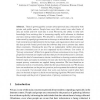Free Online Productivity Tools
i2Speak
i2Symbol
i2OCR
iTex2Img
iWeb2Print
iWeb2Shot
i2Type
iPdf2Split
iPdf2Merge
i2Bopomofo
i2Arabic
i2Style
i2Image
i2PDF
iLatex2Rtf
Sci2ools
118
click to vote
TLCA
2005
Springer
2005
Springer
Privacy in Data Mining Using Formal Methods
There is growing public concern about personal data collected by both private and public sectors. People have very little control over what kinds of data are stored and how such data is used. Moreover, the ability to infer new knowledge from existing data is increasing rapidly with advances in database and data mining technologies. We describe a solution which allows people to take control by specifying constraints on the ways in which their data can be used. User constraints are represented in formal logic, and organizations that want to use this data provide formal proofs that the software they use to process data meets these constraints. Checking the proof by an independent verifier demonstrates that user constraints are (or are not) respected by this software. Our notion of “privacy correctness” differs from general software correctness in two ways. First, properties of interest are simpler and thus their proofs should be easier to automate. Second, this kind of correctness is...
Data Mining Technologies | Privacy Constraints | Theoretical Computer Science | TLCA 2005 | User Constraints |
Related Content
| Added | 28 Jun 2010 |
| Updated | 28 Jun 2010 |
| Type | Conference |
| Year | 2005 |
| Where | TLCA |
| Authors | Stan Matwin, Amy P. Felty, István T. Hernádvölgyi, Venanzio Capretta |
Comments (0)

